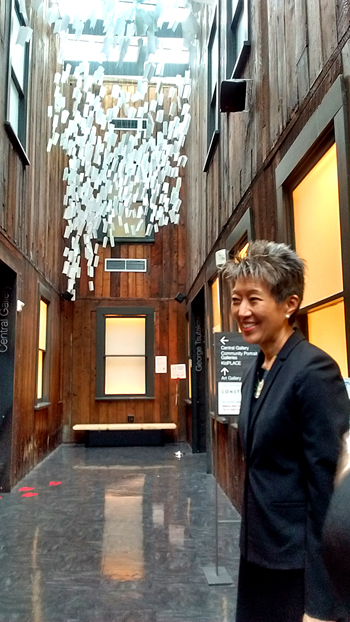
Jane Chu, at the Letter Cloud in the West lightwell of The Wing (Photo by Ruth Bayang/NWAW)
By Ruth Bayang
Northwest Asian Weekly
Jane Chu, the head of the National Endowment for the Arts (NEA), got a first-hand look at diversity through the arts at Seattle’s Wing Luke Museum on Feb. 17.
Chu’s Chinese name is Ji Jen, which means virtue and integrity. She was born in Shawnee, Okla., to Chinese immigrants and was raised in rural Arkansas. Chu’s childhood was an exercise in appreciating opposite perspectives. She remembers that her parents liked to eat bok choy and noodles, while she preferred corn dogs and pizza.
“I appreciate my own Asian heritage and honor all the different types of ethnicities,” said Chu. “That’s what we want to honor — the different perspectives of people coming from different points of view, countries, cultures — without force-fitting everybody to be exactly alike.”
Songwriting challenge
Chu participated in a town hall meeting at the Wing where she announced and launched the Musical Theater Songwriting Challenge. The competition, for high school students, will be held in three different locations across the nation, including Dallas, Minneapolis, and Seattle.
Finalists will travel to New York for an intensive songwriting workshop with professional singers, songwriters, and producers. The national winner will receive a $5,000 scholarship award, and each national runner-up will receive $2,500.
The Musical Theater Songwriting Challenge is part of the NEA’s 50th anniversary celebration. “The heart of the original words that created the NEA 50 years ago were nurture, elevate, and sustain creativity in America,” Chu said. The songwriting competition is about celebrating and honoring future generations and looking forward to the next 50 years.

From left: Ellen Ferguson, museum co-president; Jane Chu, National Endowment for the Arts chair, Beth Takekawa, museum executive director. (Photo credit by Ruth Bayang/NWAW)
A musical start
Chu herself is an accomplished artist and musician. Her parents enrolled her in piano lessons as a young girl. Chu majored in music in college, earning bachelor’s and master’s degrees in piano performance, music education, and piano pedagogy from Ouachita Baptist University and Southern Methodist University. That is in addition to a master’s degree in business administration from Rockhurst University and a doctorate in philanthropic studies from Indiana University.

A staffer demonstrates the technology that is crucial to the “Brush the Sky” gallery
Arts touching science
As a daughter of immigrants, Chu understands the challenges other immigrants face. Her parents spoke to each other in Mandarin but wanted Chu to speak only English at home, so she would fit in at school.
Chu shared that she met a fifth-grader from China on her flight to Seattle. Chu started a conversation with the girl in Chinese, and the girl replied back in English, “For an American, that’s pretty good.”
Many immigrants enter the American school system without speaking a word of English. Chu recounted a visit to an elementary school where, in one class, only two of 25 students spoke English. One teacher used the arts curriculum to teach science —and test scores for those non-English speakers skyrocketed.
“Arts touching science,” Chu said. “You see the power of the arts as adding a dimension to people’s ability to learn.” Chu said teaching subjects like math and science through an arts curriculum evens the playing field for all.
Karen Hanan, director of the Washington State Arts Commission, who was there for Chu’s visit, agrees. She said removing the arts curriculum means children will not get a complete education, which is a disservice to them and takes away opportunities to develop their creative side. Hanan said 40 percent of NEA’s funding goes to states, and in Washington, those funds are matched by a state appropriation.
As the NEA heads into the next 50 years, Chu speculates that perhaps America could learn a lesson from the past to move forward into the future. “America became America through creativity and innovation — and solving old, tired problems in new ways,” Chu said. “The arts help us think a different way. It allows us to express ourselves, make our lives better.” (end)
Ruth Bayang can be reached at info@nwasianweekly.com.



